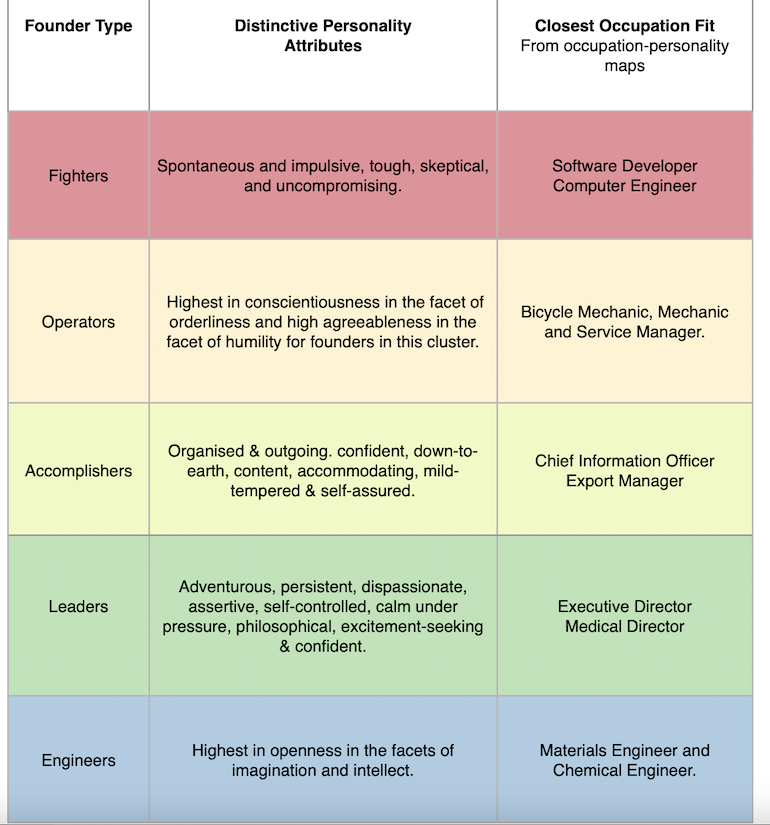You’ve heard VC investors say “we back founders” ahead on an idea and it seems that founders are key to the success of a startup, according to a new study into their personality types.
The study, The impact of founder personalities on startup success, published today in Scientific Reports, shows founders of successful startups have personality traits that differ significantly from ordinary mortals – and that these traits are more important for success than many other factors.
Six researchers from Australian and UK universities, led by Paul X. McCarthy, an adjunct professor at the UNSW, concluded that a founder’s personality – or the combined personalities of the founding team – are paramount to success
“We find that personality traits don’t simply matter for startups – they are critical to elevating the chances of success,” Prof McCarthy said.
“A small number of astute venture capitalists have suspected this for some time, but now we have the data to demonstrate this is the case.”
The team, which included researchers from Oxford and Melbourne universities and UTS, inferred the personality profiles of founders from more than 21,000 startups by trawling through their Twitter posts, running machine learning analysis over their language and activity.
The algorithm could distinguish successful startup founders with 82.5% accuracy.
They then correlated the personality profiles to Crunchbase data to check out their exit success, be it an acquisition or public listing.
Six types of founders
Dr Marian-Andrei Rizoiu, a senior lecturer leading the Behavioural Data Science lab at UTS said: “we used machine learning and a variety of advanced statistical tests to reveal that there is not just one type of successful founder but indeed six types.”
University of Melbourne Associate Professor Peggy Kern said their findings clearly show there’s no one ideal ‘founder-type’ personality.
““Instead, the Big Five personality traits of successful startup founders, which we can break down further across 30 dimensions, reveal six distinct types: fighters, operators, accomplishers, leaders, engineers and developers,” she said.

The six founder types. Source: The impact of founder personalities on startup success,
Successful founders were found to have the Big Five personality traits – the widely accepted model of human personality measuring openness to experience, conscientiousness, extraversion, agreeableness, and neuroticism – significantly differ from that of the population at large.
Those include a preference for variety, novelty and starting new things (ie open to adventure), being the centre of attention (lower levels of modesty) and exuberant (high activity levels).
Prof. McCarthy said you can see how the personality types play out in many notable examples.

Canva cofounder Melanie Perkins. Photo: supplied
“The adventurousness and openness to experience of Melanie Perkins, the assertiveness and confidence of Steve Jobs, the exuberance and energy of Richard Branson, the calm under pressure Jeff Bezos, the discipline and focus of Mark Zuckerberg, and the trustworthiness of Larry Page and Sergey Brin underpin their company’s success,” he said.
But while personality is crucial, Prof. McCarthy says many other factors still play a role in the ultimate success of founder-led companies, including luck, timing, and connections.
“Startups, especially during their earliest stages, before there’s any demonstrable customer traction rely to a large extent on social proof,” he said.
“In other words, trust in the founders, which can sometimes present barriers for many groups including women, people who have not worked in tech before, or attended prestigious universities.”
He points to Canva cofounder Melanie Perkins as an example of someone who faced those hurdles, and was turned down by more than 100 investors before finally landing funding. She’s described herself as “determined, stubborn and adventurous.”
The researchers set out to measure the relative significance of personality on the likelihood of success versus other firm-level variables and concluded that a founder’s personality was more predictive of success than the industry (5 times) and the age of the startup (2 times).
Why diversity matters
They also found startups with diverse and specific combinations of founder types – an adventurous’ leader’, an imaginative ‘engineer’, and an extroverted ‘developer’, for example – had significantly higher odds of success.
The more the merrier is a startup truism according to study co-author Dr Fabian Stephany, from the Oxford Internet Institute, University of Oxford
“Firms with three or more founders are more than twice as likely to succeed than solo-founded startups,” he said.
“Furthermore, those with diverse combinations of types of founders have eight to ten times more chance of success than single founder organisations.”
Prof McCarthy points to an observation by OpenAI cofounder Sam Altman when he ran the Y-Combinator accelerator and said “cofounder relationships are among the most important” in a company.
“While all startups are high risk, the risk becomes lower with more founders, particularly if they have distinct personality traits,” Prof. McCarthy said.
“Largely founding a startup is a team sport and now we can see clearly that having complementary personalities in the foundation team has an outsized impact on the venture’s likelihood of success, which we’ve termed the Ensemble Theory of Success.
Broader implications
The findings have critical applications for entrepreneurs, investors, and policymakers, as well as to create of more resilient startups
“By understanding the impact of founder personalities on startup success, we can make better decisions about which startups to support and help fledgling companies form foundation teams with the best chances of success,” Prof. McCarthy said.
It also offers insights more broadly into the benefits of personality diversity in other sectors as well finding talent outside traditional startup recruitment channels.
“There are lessons here for organisations of all kinds about the importance of having a diversity of personality types in teams, which can lead to stronger performance and impact,” Prof. McCarthy said.
“It’s not part of this study, but we estimate 8% of people worldwide may have personality traits that could make them successful founders. Likely, many are not in the entrepreneurial field right now.
“Identifying these misfits and people in roles unsuited to their personalities will be the focus of some of our follow-up studies.”
Download the study, The impact of founder personalities on startup success, here.




















Trending
Daily startup news and insights, delivered to your inbox.